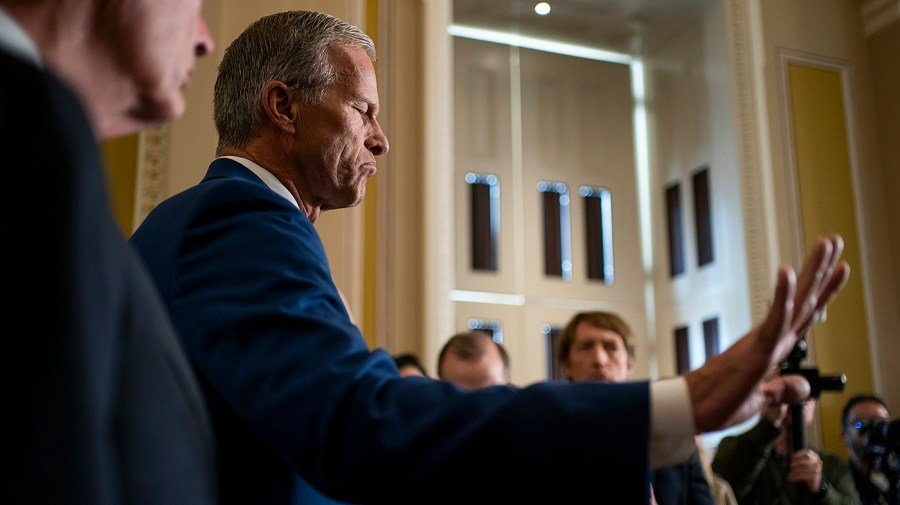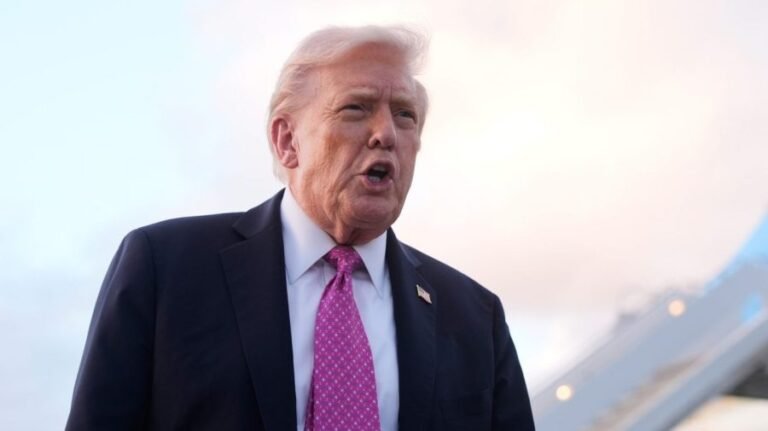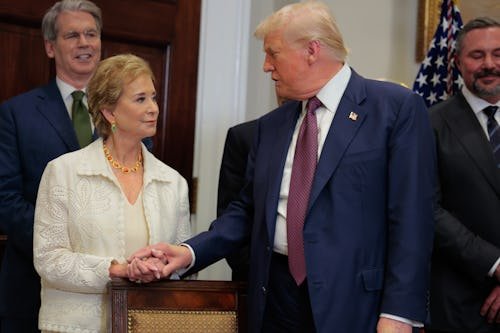
Republicans are trying to win back political momentum in the government shutdown fight from Democrats, putting their rivals on the defensive and taking solace from polls showing Americans are starting to shift more blame to Democrats for the funding stalemate.
After struggling through a bad last week that highlighted their divisions on health care, Republicans have showed signs of regrouping.
They’ve forced Democrats to vote twice on a House-passed government funding measure without the political cover of also voting on an alternative Democratic proposal that funds the government and addresses rising health care insurance costs. Legislation to fund the government was again blocked in the Senate on Wednesday.
On Thursday, the Senate GOP will bring a major defense spending bill to the floor, daring Democrats to vote against it and underlining arguments the shutdown is hurting military families.
Democrats have argued that Republicans own the shutdown, since they have control of the White House and both chambers of Congress.
Yet the GOP is taking some positive signs from recent polls.
While more Americans blame Republicans than Democrats for the shutdown, some surveys show an uptick in the number of voters blaming Democrats.
An Economist/YouGov poll of 1,622 U.S. adults conducted Oct. 10-13 showed that while Americans were still more likely to blame Republicans for the shutdown, the gap between the two parties is closing.
The survey found that 39 percent of respondents blamed Republicans in Congress and 33 percent blamed Democrats. But a similar poll last week showed a bigger gap, with 41 percent of respondents blaming Republicans and only 30 percent blaming Democrats.
“I just think the damage being done to flying and basic services are turning people against the tactic more than anything else,” Sen. Lindsey Graham (R-S.C.) said of Democrats.
He and other Republicans believe the longer the shutdown drags on, the more the public is going to pay attention to the fact that Democrats are holding up a clean continuing resolution to win major health care policy concessions.
Graham said he’s willing to discuss ways to make health insurance more affordable “but not this way.”
A Democratic senator who requested anonymity to comment on internal caucus discussions said there is a group of nervous centrist Democrats who would jump at the chance to vote on a bill to reopen government if President Trump makes any sort of concession to address rising health care costs.
There have been signs of disunity on the GOP side during the first two weeks of the shutdown, most notably when conservative Rep. Marjorie Taylor Greene (Ga.) ripped GOP leaders over the Affordable Care Act subsidies.
Yet Senate Majority Leader John Thune (R-S.D.) has kept his Senate Republican Conference unified behind his position of refusing to negotiate an extension of the Affordable Care Act’s enhanced health insurance premium subsidies until the government is open.
“What the Democrats need to do is to vote for a clean, short-term, nonpartisan funding resolution sitting at the desk right now in the Senate,” he said Wednesday.
Thune said he would bring the House funding bill back to the floor Thursday.
“All we need are five courageous Democrats with a backbone who aren’t afraid to buck their leadership,” he said.
“We’re willing to have … conversations about all the other issues they want to talk about but that can’t happen while they’re holding the federal government and all these federal employees and our troops and our air traffic controllers and our TSA [Transportation Security Administration] agents and our Border Patrol officials hostage,” he said.
The Republicans’ messaging strategy was in disarray last week after Trump went off script with reporters in the Oval Office by declaring he would be open to “the right deal” with Democrats and even suggested that negotiations were ongoing.
Trump’s comments undercut the GOP leadership’s strategy on Capitol Hill, but since then he’s shown more discipline.
That opened the way for Republicans to play offense this week.
For the first time since the government shut down on Oct. 1, Thune on Tuesday forced Democrats to vote on a House-passed bill to reopen the government without also getting a chance to vote on their competing plan.
Despite the pressure, only three members of the Democratic caucus have voted for the House-passed funding stopgap: Sens. Catherine Cortez Masto (Nev.), John Fetterman (Pa.) and Angus King (Maine), an independent who caucuses with Democrats.
With the defense bill move, which came as a surprise to Democrats, Thune is trying to get the regular appropriations process back on track.
If Democrats vote to advance the defense measure, it would be at odds with their staunch opposition to the clean House-passed funding stopgap, which has already failed nine times on the Senate floor.
The Democrats’ position is somewhat undermined by a lack of clarity about what it would take to get them to vote to reopen the federal government.
Democrats have rejected a proposal to reopen the government in exchange for a vote on extending the expiring health insurance subsidies, demanding instead a “real negotiation” to fix what they say is a looming crisis.
Senate Democratic Leader Chuck Schumer (N.Y.), House Democratic Leader Hakeem Jeffries (N.Y.) and other Democratic leaders have demanded a negotiation with Trump and GOP leaders, but they haven’t said what precisely they would need to support a short-term funding bill.
Schumer has repeatedly called on Trump to negotiate with Democrats but it hasn’t produced any movement at the White House.
Schumer has been hit hard by the GOP over remarks he made last week that “every day gets better for us” during the shutdown, though he defended those comments at a Wednesday press conference by insisting that Democrats are winning the messaging battle.
“Every day more and more Democrats see how bad this health crisis is as they get their notices, as they hear all about it,” he said, referring to notices from insurance companies warning of rising premium costs.
He presented a placard showing that constituents in New York’s 21st Congressional District, which is represented by Rep. Elise Stefanik (R), will see their health insurance premiums soar from $282 a month to $1,679 unless the enhanced Affordable Care Act subsidies are extended.
Meanwhile, Speaker Mike Johnson (R-La.) continues to keep the House in recess in hopes of Senate Democrats capitulating and voting for the House-passed continuing resolution to fund the government until Nov. 21.
The strongest leverage Republicans have in the standoff is the expectation shared by lawmakers in both parties that if Trump agrees to a major concession now in response to Democrats’ tactics, it would encourage senators in the minority party to repeatedly threaten government shutdowns in the future to demand big policy wins.
“If we give in here, it will be something else next time,” Graham warned. “Let’s just open up the government, talk about health care.”






